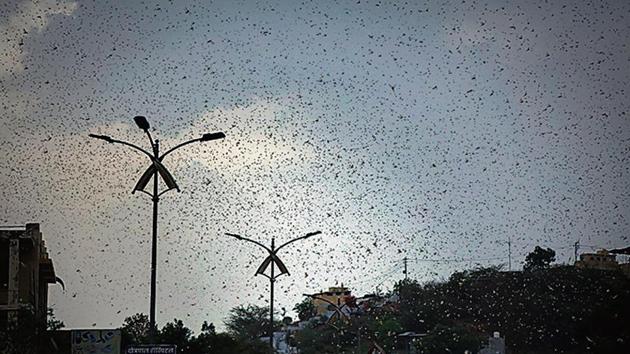Locust swarms likely headed to MP from Rajasthan
Small swarms of the species of grasshoppers have also reached as far as Vidarbha, other parts of Maharashtra as well as Uttar Pradesh and Madhya Pradesh
New Delhi: Locust swarms were likely to move from Rajasthan’s Dausa to Dholpur and Morena in Madhya Pradesh on Wednesday and damage all kinds of vegetation and not only standing crop, the Locust Warning Organisation (LWO) said while calling a reported alert that they were headed towards Delhi incorrect.

Small swarms of the species of grasshoppers have also reached as far as Vidarbha, other parts of Maharashtra as well as Uttar Pradesh and Madhya Pradesh. “The alert that they are headed towards Delhi on Wednesday is incorrect. They are headed towards Morena for now,” said LWO’s directorate of plant protection quarantine & storage deputy director, KL Gurjar.
LWO has deployed drones and 50 teams to track the swarms in Rajasthan and Madhya Pradesh. Fire brigades are also being deployed depending on the size and location of the swarms. “We have controlled them over 47,000 ha of land in Rajasthan, Gujarat, Rajasthan and Madhya Pradesh. The swarms, which have reached Maharashtra, are very small. Thankfully, we did not have any standing crop there but they can destroy all kinds of vegetation,” said Gurjar.
The teams are spraying organophosphate insecticides, malathion 96 and chlorpyrifos, depending on the location.
Gurjar said they will control the swarms before they start breeding during the monsoon next month and ensure there is no second wave.
LWO said wind patterns have pushed the main branch of the voracious desert locust towards Madhya Pradesh and Maharashtra from Rajasthan and threaten crops like cotton, pulses and maize, ahead of a crucial rice-planting season. “Current winds patterns will propel the pests towards newer parts of Madhya Pradesh and Maharashtra, sparing Delhi for now,” an official of the top locust monitoring wing of the agriculture ministry said.
“For the next two days, moderate winds could blow them into parts of eastern Madhya Pradesh and Vidharbha of Maharashtra, as winds are northwesterly,” Mahesh Palawat, vice-president, meteorology, of Skymet, a private forecaster, said.
Delhi could be spared for another four days. Winds after two days will take the opposite direction from what they are now, travelling from Maharashtra and Madhya Pradesh towards Rajasthan, Palawat said. A cyclonic formation over Rajasthan thereafter may change winds patterns towards Delhi, he said.
Locusts can fly up to 150 km daily and a one square km swarm can eat as much food as 35,000 people in a single day, according to the Food and Agriculture Organization (FAO)’s Desert Locust Information Service bulletin.
Rajasthan is the worst-hit state by the swarms and they overran Jaipur on Monday. The Centre has released aid worth Rs 68.65 crore to compensate farmers there for last year’s pest attack. The compensation under the National Disaster Relief Fund was cleared for release by a high-level committee headed by Union home minister Amit Shah, according to a document dated May 23 reviewed by HT.
The country continues to be on alert for crop-munching desert locusts, which according to a UN warning, pose a “severe” risk to the country’s agriculture this year. There has been an early-than-usual summer invasion of the species of grasshoppers from across Pakistan.
This has prompted the Union agriculture ministry to consider importing equipment from the UK, apart from deploying drones, satellite-derived tools, special fire-tenders and sprayers at pre-identified border locations.
A briefing of FAO states that the current situation remains extremely alarming in East Africa. “At this time, there is a risk that swarms will migrate to the summer breeding areas along both sides of the Indo-Pakistan border as well as to Sudan and perhaps West Africa.”
A surge in locust attacks since last year is also being attributed to favourable breeding weather caused by a large number of cyclones in East Africa. India, China and Pakistan face the most risk in Asia, according to the UN. Pakistan has already declared an agricultural emergency.
LWO on May 15 warned locust swarms were expected to arrive in India from spring breeding areas and said it will continue to be vigilant over their possible invasion.
Experts said excess rains in the pre-monsoon season in north India also provided greener pastures for the locusts to thrive earlier than normal this year. The deadly locust invasion in Africa, Middle East and South Asia has been linked to freak weather associated with climate crisis.
“Heavy rain triggers the growth of vegetation in arid areas where desert locusts can then grow and breed. These locusts which migrated to India early this year might have found greener pastures as the pre-monsoon rains during March-May were in excess over north India this year,” said Roxy Mathew Koll, a climate scientist at the Indian Institute of Tropical Meteorology.
K K Singh, a senior scientist at India Meteorological Department, said there is not a direct link. “We cannot say that because we had excess pre-monsoon rains and greenery in the northwest and central India so locusts have invaded us. There are many other factors.”
Get Current Updates on Election 2024, India News, Lok Sabha Election 2024 LIVE along with Latest News and Top Headlines from India and around the world.



